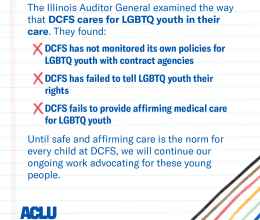
Testimony of Nora Collins-Mandeville, Director of Systems Reform Policy, Before the Senate Appropriations Committee on the DCFS Budget
April 17, 2018
To Chair Steans, Spokesperson Righter, and members of the Senate Appropriations Committee,
We appreciate the opportunity to speak with you today to express concerns about the DCFS budget for the upcoming fiscal year. My name is Nora Collins-Mandeville. I’m the Director of Systems Reform Policy at the ACLU of Illinois where I advocate in tandem with legal counsel for fundamental system change for children in DCFS care.
The ACLU filed the B.H. lawsuit against DCFS in 1988 alleging that the level of care being provided to children in substitute care was constitutionally inadequate. The core of it really is that the Department has to maintain a system that provides adequate services and safe, stable placements. We’ve had to go back to court in the past several years to deal with certain issues, including in response to the proposed budget in 2009 to prevent a cut of hundreds of millions of dollars which we believed would have thrown children out on the street and substantially disrupted the services provided to them.
Following the revolving door of directors at the agency in recent years, we went back to court to address the current crisis of the Department’s failure to provide essential services and adequate placements to meet the needs of children with behavioral and mental health issues. In September 2016, we negotiated a Court-approved Implementation Plan with the Department and Court-appointed experts who found systemic problems within DCFS, including the fact that Illinois lacks adequate home- and community-based mental health resources and that children languish in intensive residential treatment centers and group home settings while waiting for less restrictive placements. Those problems continue today. The Department’s progress under the plan has been too slow, due in part to the lack of cooperation we have received from the current DCFS administration.
The proposed DCFS budget does not give us confidence in the Department’s commitment and ability to address the systemic problems within DCFS, including the lack of adequate home- and community-based mental health resources. The proposed budget is essentially flat in spite of continuing and overwhelming evidence of the need for more service development and capacity-building in the system. For example, dozens of youth continue to be placed in psychiatric hospitals beyond medical necessity and dozens of youth have been placed in facilities out of state –away from the families and communities they know and love—because resources in the state are non-existent or otherwise unavailable. Yet, no additional dollars in the budget are provided for identifying or establishing placements to which youth could step down, or providing them the needed services.
Additionally, while we were able to obtain a court order compelling the state to maintain payments to providers of services to our clients in B.H. during the budget impasse, a devastating amount of damage was done to surrounding community-based services needed by youth and families touched by the system that were not protected by our decree. The proposed budget does not appear to include resources to develop, restore, and provide the community programs needed to serve the children and families coming to the Department’s attention.
The proposed budget should be transparent because it should be driven by fulfilling the need for services. Instead, the budget is based on assumptions that are impossible to confirm since neither the bases for those assumptions nor current data is available through the Department, and it is unclear whether or not the Department has the data. For example, the Department’s publicly available Executive Statistical Summary containing the number of intact and non-intact cases in care, call volume to the hotline, number of unfounded and indicated investigation reports, and number of youth in different kinds of placements has not been updated on the Department’s website since July of 2017. That report had previously been updated on a monthly basis. We have encountered regular delay and, in some cases, complete obstruction to data and information from the Department in the context of our lawsuit, and that lack of transparency surrounding the budget is particularly concerning.
The Department has not produced data showing that it has thoughtfully analyzed and measured the services and placement needs of youth in care, let alone projections for youth who will come into care in the future. For example, how many times did youth service plans call for a service that they did not receive? What was the service? Why wasn’t it provided? Was it unavailable because it didn’t exist? Was transportation an issue? Was there a waitlist? The Department must undertake the process of measuring the quantity and type of services that youth need and get to the very real work of developing those services and supports. At the very least, until the Department completes that task, the flexibility to fulfill those needs should be reflected in the proposed budget, but it currently is not.
This is of particular significance with regard to the proposed transition of youth in care to the managed care system (through an HFS contract), which the Department has projected for October 1st. It is unclear where money for the proposed transition is going to be housed and how DCFS and HFS have projected their future budgetary needs for services covered by the MCO and not covered by the MCO (and therefore, by DCFS). This is critical to ensuring minimal disruption of services and continuity of care for our youth if and when the MCO is in place. It is not clear from the budget that DCFS is taking on any responsibility or that it has accounted for the flexibility necessary to undertake such a monumental shift.
The proposed budget also lacks the necessary flexibility to address potential shifts in the workforce crisis. The Department’s plan in the proposed budget to add 32 “experienced caseworkers” to the DCFS workforce in order to expand its ability to handle those intact family cases the Department identifies as highest risk (children birth – 3 years old) ignores that there is no evidence to suggest that privatization itself results in higher danger to children. Why would intact family services, if properly funded and managed, be less safe for a child simply because the services were delivered by a private agency, rather than directly by the Department? Further, the “experienced caseworkers” are going to come from the private agency sector, which means that it will lose some of its more skilled workers after an already weakened workforce due to the budget impasse. That disruption in private agency sector workforce is harmful to children and families, resulting in loss of trust, more trauma, and a sense of abandonment.
Finally, the proposed budget lacks the necessary flexibility to address potential federal shifts in funding. The budget assumes continuation of a federal waiver of restrictions on the use of federal funds to support and evaluate more intensive services for foster youth which the Department is carrying out through the B.H. Implementation Plan. The waiver is scheduled to end July 1, 2018 and the Department does not yet know if it will be extended.
The proposed budget does not contain the necessary flexibility to address the current and future needs and rights of children within DCFS. We encourage the Committee and its members to take a close look at the assumptions and data DCFS relies on in its projections. The B.H. Plaintiffs continue to press for reform to the extent that is possible through litigation in federal court, but the Legislature has important powers available to it as well, both in respect to funding decisions and enactment of child welfare legislation. It is time for a real, sustained commitment to reform within DCFS. We believe that the General Assembly can be part of this solution.


